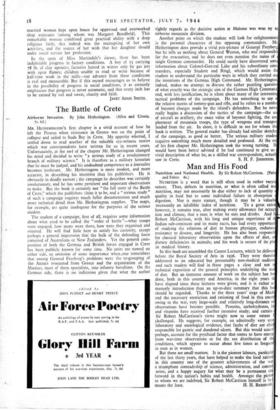Man and His Food
NutarrioN is a word that is still often used in rather vary senses. Thus, defects in nutrition, or what is often called m nutrition, may not necessarily be due either to lack of quantity quality in food but to some individual failure in absorption digestion. Nor is mere stature, though it may be a valuab necessarily an infallible index of nutrition. To a great exte however, it remains true, after making every allowance for occup tion and climate, that a man is what he eats and drinks. And S Robert McCarriion, with his long and unique experience of t Indian sub-continent and its many races, has had every opportuni of studying the relations of diet to human physique, enduran resistance to disease, and longevity. He has also been responsib for classical laboratory observations upon the effects of diet, a dietary deficiencies in animals; and his work is secure of its pla in medical history.
In this book are assembled the Cantor Lectures, which he delive before the Royal Society of Arts in 1936. They were theref addressed to an educated but presumably non-medical audien and such readers will find in these pages a dear and not t technical exposition of the general principles underlying the stu of diet. But an immense amount of work on the subject has done, both in this country and America, in the eight years t have elapsed since these lectures were given; and it is rather as masterly introduction than an up-to-date summary that this should be regarded. Thanks to the three years' siege of Mad and the necessary restriction and rationing of food in this coun owing to the war, very large-scale and relatively long-distance n observations have become possible. Proteins, carbohydrates, fa and vitamins have received further intensive study; and certain Sir Robert McCarrison's views might now to some extent challenged. He suggests, for example, on admittedly very stro laboratory and sociological evidence, that faults of diet are chie responsible for gastric and duodenal :11cers. But this would scare perhaps, account for the psychical factor that seems to have emu from war-time observations or for the sex distribution of th conditions, which appear to occur about five times as frequen in men as in women.
But these are small matters. It is the pioneer labours, particul of the last thirty years, that have helped to make the food ratio in this country one of the greatest achievements of the war a triumphant comradeship of science, administration, and contra sense, and a happy augury for what may be a permanent s forward in the nation's habits and health. Amongst the pion to whom we are indebted, Sir Robert McCarrison himself is by


























 Previous page
Previous page